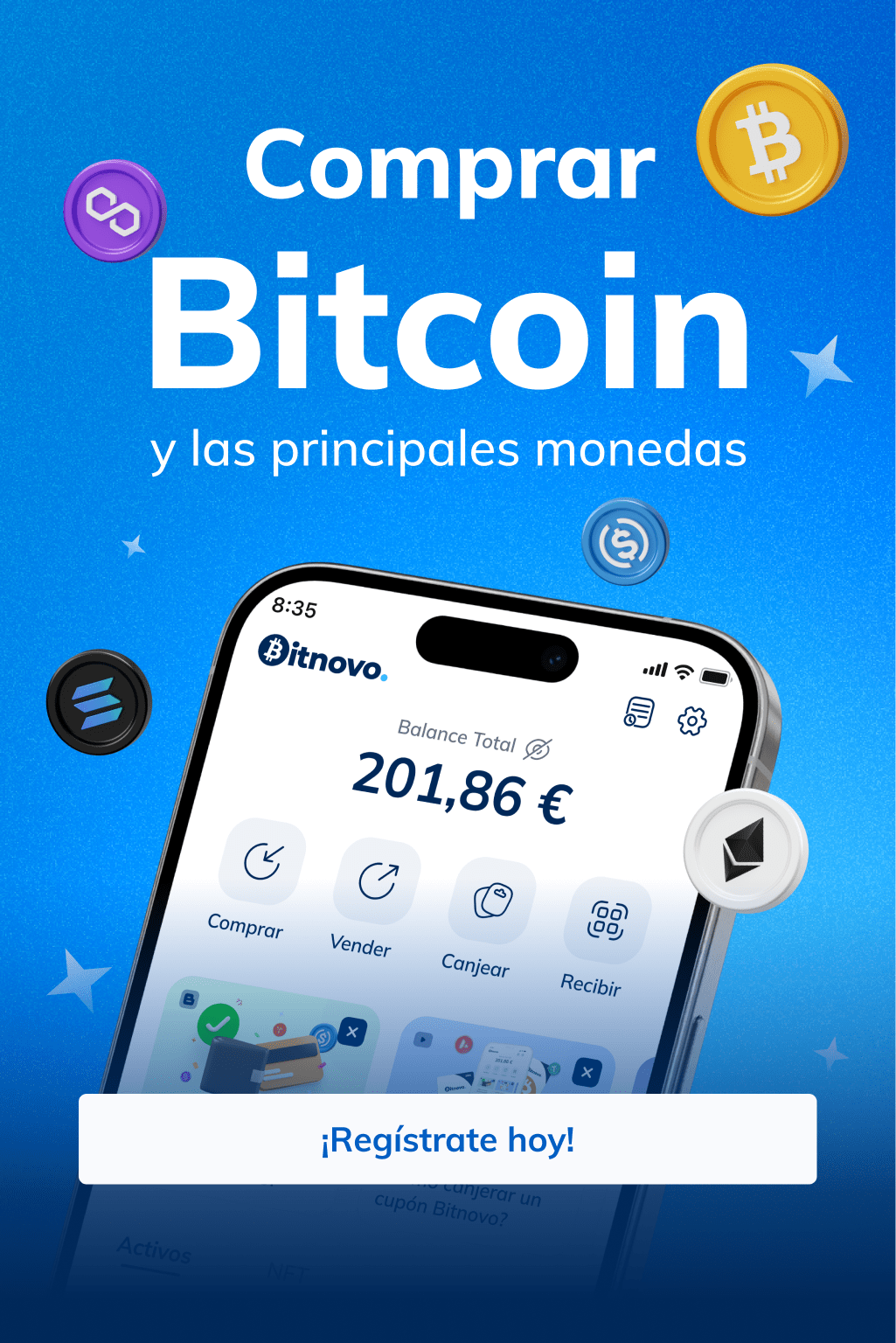
Table of Contents
ToggleStarting to accept cryptocurrencies like Bitcoin, Ethereum, and more in your business is very simple; just contact Bitnovo, and you’re set. However, this isn’t the most important question to answer, right? Instead, it’s: Why should I accept cryptocurrencies in my business? Is it worth it? Is this payment method gaining traction? Keep reading to find out more.
Are European consumers willing to pay with cryptocurrencies?
In recent years, the entire European Union has seen a growing interest in cryptocurrencies as an investment and a payment method. More and more consumers own digital assets, and many businesses—from coffee shops to large retailers—are exploring accepting them in physical stores and e-commerce.

According to the latest data from the European Central Bank, in 2024, around 9% of the eurozone population owns cryptocurrencies, more than double the 4% in 2022, and it’s very likely that this number will continue to grow increasingly faster. According to this study, here are the levels in some European countries:
-
Slovenia and Greece: 14–15% of the population
-
Spain, France, and Croatia: 9% of the population
On the other hand, in the Spanish market, 19% of cryptocurrency holders use them to make payments, and another 20% have them both for investment and payment purposes. In other words, nearly 40% of Spanish crypto users consider cryptocurrencies as a means of payment and not just a store of value.
Although the majority of consumers still prefer traditional methods, such as cash or cards, the trend points to growing demand. For example, at the beginning of 2022, a global study by Visa found that 13% of consumers already expected retail stores to offer cryptocurrency payments soon.
As we can see, consumers, especially the younger audience, might rank businesses that accept cryptocurrencies higher in their purchase preferences compared to competitors who haven’t added Bitcoin (BTC) or Ethereum (ETH) to their repertoire.
Trends in cryptocurrency adoption among European businesses
We’ve observed the consumer side, but what about brands? European businesses are increasingly adopting crypto payments.
What was unthinkable just a few years ago is now appearing in various sectors: coffee shops are accepting Bitcoin, online stores are adding stablecoins at checkout, and even luxury car dealerships are closing sales in cryptocurrencies across Europe.
From January to March 2024, global cryptocurrency payments grew by 20% year-over-year, with sectors like luxury goods (+39%), automotive (+56%), and electronics (+64%) leading the surge, according to the latest data.

But it doesn’t stop there; merchant surveys also reflect this trend. A 2022 Deloitte study revealed that 75% of retailers planned to accept cryptocurrencies or stablecoins as a payment method within the next two years. Therefore, echoing the data showing more than double the consumption level in 2024, it seems that Deloitte’s experts were correct.
We could spend hours mentioning how more and more businesses, regardless of their size, are adopting cryptocurrencies as a payment method. Examples like McDonald’s in Switzerland, airBaltic, or the Konzum supermarket demonstrate this with actions. But beyond this trend, everything indicates that integrating Bitcoin as a form of payment is becoming a strategic necessity for businesses. Not only because of the growing consumer demand but also due to the competitive pressure in the market.

Competitive advantages of offering crypto payments in my business
We now know there’s increasing pressure from consumers for their favorite brands to accept crypto. But that’s not all: more and more businesses are joining this trend, adding additional pressure. There’s a real risk that your competitors might get ahead by adopting this innovation before your company does.
However, one of the most common obstacles for businesses is the perception that “accepting crypto is expensive, complicated, or hard to understand.” But nothing could be further from the truth. Today, there are simple and accessible solutions that allow you to integrate crypto payments without complications. Plus, doing so offers clear competitive advantages — from attracting new customers to reducing operational costs.
-
Access to new customers: Accepting Bitcoin and other cryptos allows you to attract a modern, tech-savvy segment of consumers who value this option. Many of these people have disposable income and are looking for businesses aligned with their interests.
-
Innovative brand image: Offering Bitcoin or other cryptocurrencies at checkout positions your business as pioneering and innovative. It’s a modern signal that can generate word-of-mouth buzz and set you apart from traditional competitors. Even if crypto volume is initially modest, the branding and marketing effect can be valuable.
-
Lower transaction fees: Crypto payment gateways typically charge lower fees than credit cards or other payment methods. For example, many crypto processors charge around ~1%, compared to the typical ~2–3% from Visa/Mastercard or even >3% from platforms like PayPal.
-
No chargebacks or fraud: Crypto payments, once confirmed, are irreversible. This means your business won’t face the dreaded chargebacks or fraudulent returns common with cards — offering great peace of mind, especially in international e-commerce.
-
Speed and immediate liquidity: A card sale might take days to settle into the merchant’s account, but a crypto payment can be converted to cash almost instantly.

Common Entry Barriers to Accepting Cryptocurrency Payments in My Business
We already know the benefits, but let’s be realistic: nothing in life comes without challenges. So let’s address the elephant in the room. We’re referring to those barriers to entry or points of friction that many businesses still see in cryptocurrencies and that keep them from accepting them as a form of payment.
The good news is that, with more than 15 years of evolution, the crypto sector has managed to address—and overcome—many of these obstacles.
-
Price volatility: The fluctuation in the value of Bitcoin and other cryptocurrencies scares many merchants. “What if I accept €100 in BTC and tomorrow it’s only worth €80?” — they wonder. This uncertainty is real, but it has a solution. The most commonly used option is to work with payment processors that automatically convert the crypto received into local currency at the time of sale.
-
Lack of knowledge and perceived complexity: Blockchain technology can seem complex at first glance. Terms like wallets, private keys, or different blockchains cause uncertainty among business owners who aren’t yet familiar. This barrier is overcome through education and simple implementation. It’s key to choose a user-friendly payment platform that offers familiar tools (for example, accepting payments via QR code in-store or a button on your website — something very simple for the user).
-
Unclear legal and tax framework: For years, crypto regulation was a “grey area.” Many merchants feared getting involved due to potential legal or tax complications. However, in Europe this is changing rapidly. The European Union approved the MiCA regulation (Markets in Crypto-Assets) in 2023, which establishes a clear legal framework for crypto assets. To simplify matters, it’s best to rely on platforms that comply with regulations and provide transaction reports — making accounting easier.
-
Technical integration with existing systems: Some businesses worry about how to integrate crypto payments into their point-of-sale or online store without expensive development. The good news is that today there are turnkey solutions. Many payment platforms offer plugins for Shopify, WooCommerce, Prestashop, and others — so adding the “Pay with crypto” button is nearly as easy as installing a PayPal option. In physical stores, tools like mobile apps or terminals that generate QR codes make accepting crypto as fast as using Bizum or Twint.

Bitnovo Pay: the ideal solution to accept cryptocurrency payments in Europe
After this journey through crypto adoption, it’s only natural to wonder how to implement these ideas in our own business.
This is where Bitnovo Pay comes in — a platform specifically designed to help merchants accept cryptocurrency payments in a secure, simple way that’s adapted to the European reality.
Click here to learn more about Bitnovo Pay and to schedule a free call with our team.




